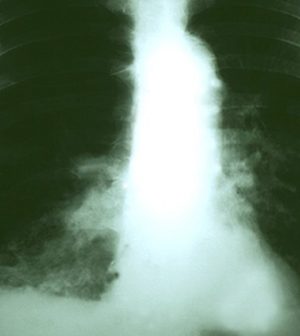- Could Your Grocery Store Meat Be Causing Recurring UTIs?
- Are You Making This Expensive Thermostat Error This Winter?
- Recognizing the Signs of Hypothyroidism
- 10 Strategies to Overcome Insomnia
- Could Artificial Sweeteners Be Aging the Brain Faster?
- Techniques for Soothing Your Nervous System
- Does the Water in Your House Smell Funny? Here’s Why
- Can a Daily Dose of Apple Cider Vinegar Actually Aid Weight Loss?
- 6 Health Beverages That Can Actually Spike Your Blood Sugar
- Treatment Options for Social Anxiety Disorder
AI Takes Aim at Lung Cancer Screening

The term artificial intelligence (AI) might bring to mind robots or self-driving cars. But one group of researchers is using a type of AI to improve lung cancer screening.
Screening is important for early diagnosis and improved survival odds, but the current lung cancer screening method has a 96 percent false positive rate.
But in the new study, investigators were able to reduce false findings of lung cancer without missing any actual cases.
A low-dose CT scan is the standard diagnostic test for people at high risk of lung cancer. In the United States, about one-quarter of these scans reveal shadows indicating nodules in the lung. Despite that positive result, fewer than 4 percent of those patients actually have cancer.
“A positive test creates anxiety, increases health care costs, and the follow-up tests are not risk-free,” said study co-author Panayiotis Benos. He’s vice chairman of computational and systems biology at the University of Pittsburgh.
“For the 96 percent of people who have benign nodules, these procedures are unnecessary. So, we try to mine the data to tell which are benign and which are malignant,” Benos explained in a university news release.
Benos and his colleagues entered CT scan data from 218 high-risk patients into a machine learning algorithm — a form of artificial intelligence — to create a model that calculates the probability of cancer.
The researchers then compared the model’s results against the patients’ actual diagnoses. The model would have spared 30 percent of patients with benign nodules from further, unnecessary tests, without missing a single case of cancer, the team reported.
According to the study authors, they were able to rule out cancer in about one-third of the patients. This means these people wouldn’t need biopsies, PET scans or short-interval CT scans. They could just make an appointment to come back in a year.
This is the first time artificial intelligence has been used in this way, the researchers said.
The study was published March 12 in the journal Thorax.
According to the American Cancer Society, lung cancer is the leading cause of cancer death among both men and women. This year, in the United States, the society estimates that there will be about 228,000 new cases of lung cancer and about 143,000 lung cancer deaths.
More information
The U.S. Centers for Disease Control and Prevention has more on lung cancer.
Source: HealthDay
Copyright © 2026 HealthDay. All rights reserved.










